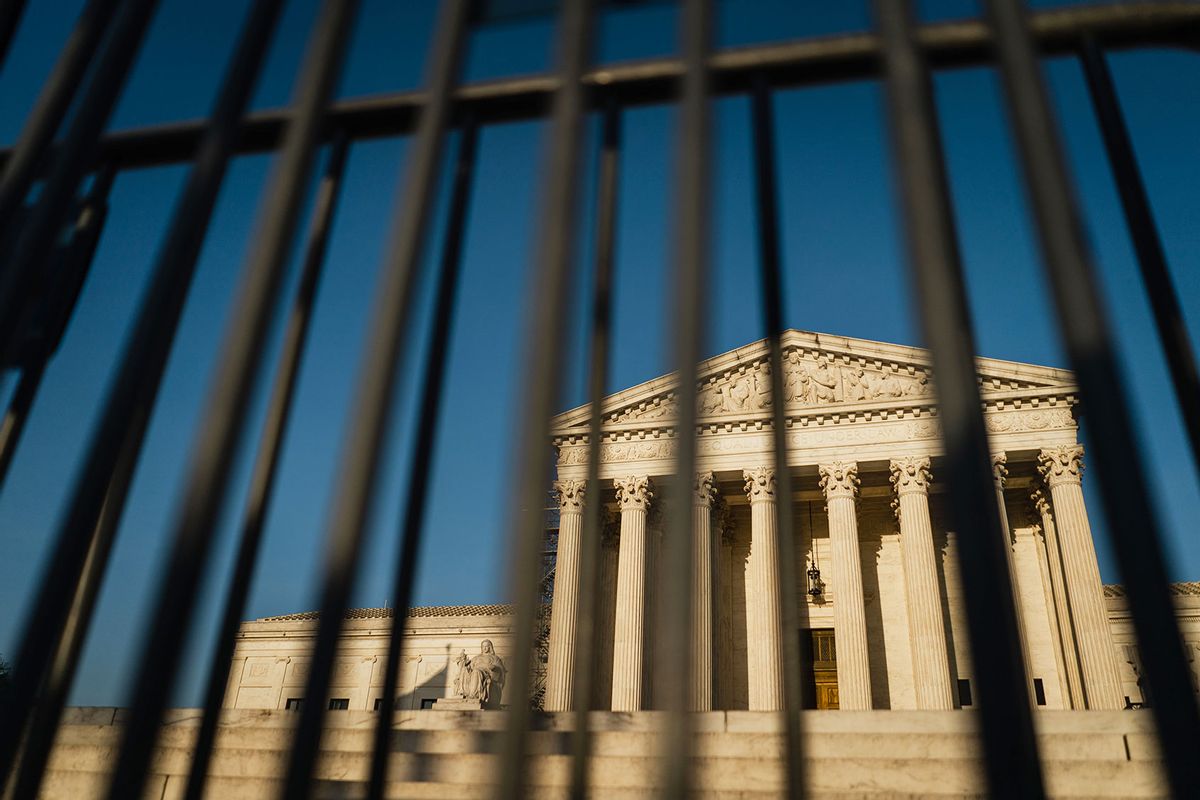While those hoping to stop the expulsion of people to an El Salvador prison under the Alien Enemies Act scored a victory in court Wednesday, a Trump-appointed judge debued a legal theory likely to rear its head again as litigation goes forward.
In J.G.G v. Trump, the case concerning the summary expulsion of Venezulan immigrants to an El Salvador prison, immigrants' rights advocates prevailed, with a federal district court panel for Washington, D.C., upholding a temporary restraining order on the removal of immigrants under the Alien Enemies Act. President Donald Trump invoked the 18th century law to support the summary removal of immigrants that the government claims are part of Tren de Aragua, a Venezuelan gang.
In the ruling, two of the three judges — Judge Karen LeCraft Henderson, appointed by former President George H.W. Bush, and Judge Patricia Millett, appointed by former President Barack Obama — agreed that the TRO should be upheld. The Justice Department has since asked the Supreme Court to take up the issue, claiming that the order jeopardizes "sensitive diplomatic negotiations and delicate national-security operations" and that the delay could allow the gang to gain "a greater foothold."
Henderson, for his part, wrote that the TRO should be upheld because Trump failed to meet the necessary conditions to invoke the Alien Enemies Act, given that there is no actual war or invasion. Millett, meanwhile, highlighted the fact that the removed immigrants were not given any opportunity to challenge the government’s assertion that they are gang members, meaning they were denied due process.
However, Judge Justin Walker, who Trump appointed, dissented from the majority opinion and argued that the TRO should not be upheld and that the summary removal of Venezuelans should be allowed to proceed.
While most of Walker’s dissent focused on questions related to the venue, with the judge arguing that the case should be heard in Texas rather than Washington, D.C., he also previewed an argument which has been made before the Supreme Court and which appears likely to be made before the Supreme Court again if this litigation makes it that far.
“The Government has also shown that the district court’s orders threaten irreparable harm to delicate negotiations with foreign powers on matters concerning national security,” Walker wrote. “And that harm, plus the asserted public interest in swiftly removing dangerous aliens, outweighs the Plaintiffs’ desire to file a suit in the District of Columbia that they concede they could have brought in Texas.”
Later in his dissent, Walker wrote that the district court’s orders, issued by Judge James Baosberg, “here threaten an ‘irreversibl[e] altering [of] the delicate diplomatic balance’ that high-level Executive officials recently struck with foreign powers.”
“The orders," Walker continued, "risk the possibility that those foreign actors will change their minds about allowing the United States to remove Tren de Aragua members to their countries. Even if they don’t change their minds, it gives them leverage to negotiate for better terms.”
Walker, disregarding the lack of any process to determine the acused's guilt or innocence, later reinforced the State Department’s assertion that irreparable harm “is all but inevitable when a court interferes with an ongoing national-security operation that is overseas or partially overseas.”
We need your help to stay independent
Ahilan Arulanantham, co-director at UCLA’s Center for Immigration Law & Policy, told Salon that, while Walker mainly argued against the decision to bring the case in Washington, D.C., the argument that courts can not rule on matters concerning foreign policy in any way is likely on the horizon.
“The underlying question of whether courts should be very differential and not get very involved in assessing the legality of these measures, because it implicates sensitive diplomatic relations, is coming one way or another,” Arulanantham said.
Arulanantham said that, in practical terms, this would essentially make it so neither deportations nor other immigration-related decisions could be the subject of judicial review, as they almost all entail some sort of agreement with another country.
A similar argument to the theory laid out by Walker was put forth in 2001, in Zadvydas v. Davis, a case concerning whether or not the government could indefinitely detain someone that they wanted to deport, even when no country would agree to receive them.
In that case, the government argued that it could indefinitely detain someone and that it was not the judiciary’s role to assess diplomatic relations, specifically the likelihood of whether or not another country might eventually agree to take an individual.
“It's another place where the government is seeking to disrupt settled law,” Arulanantham said, noting that Supreme Court Justice Clarence Thomas has called for the case to be overturned.
Indeed, Thomas, in Zadvydas v. Davis, dissented from the majority opinion and signed on to the dissent of former Justice Antonin Scalia, who wrote: “I do not believe that ... there may be some situations in which the courts can order release.”
Read more
about mass deportations



Shares